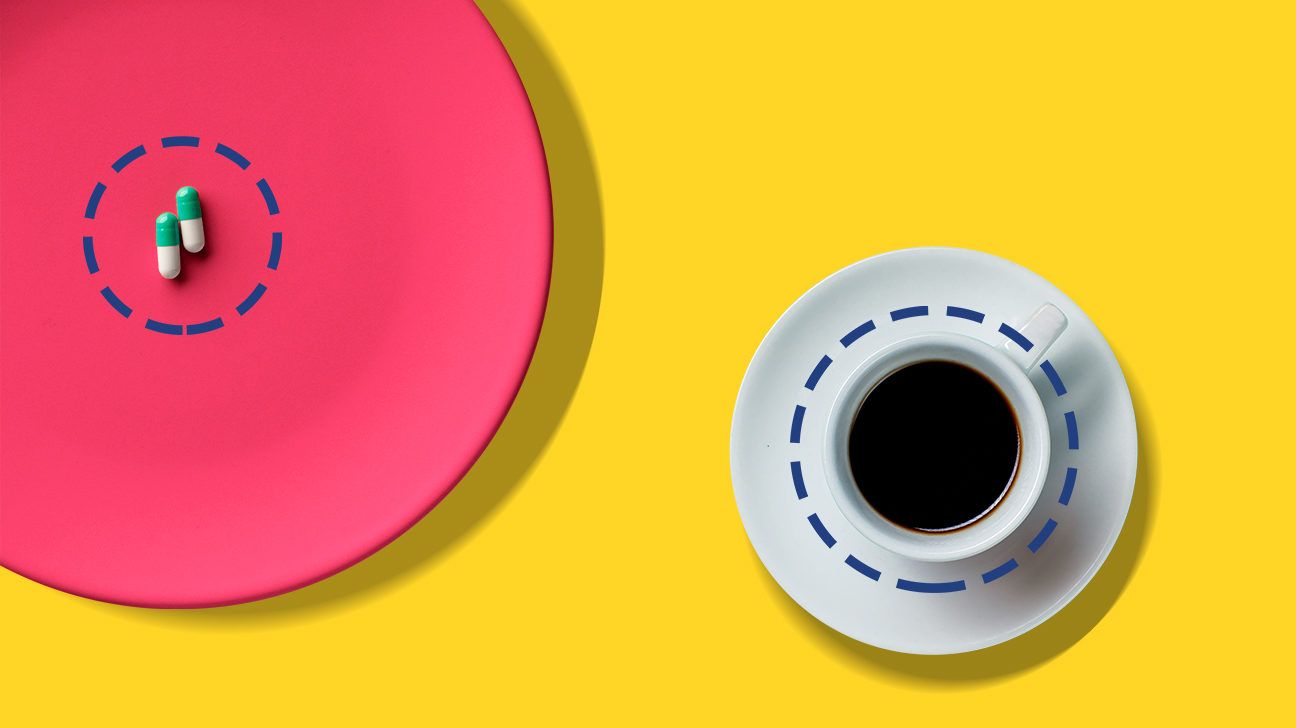Side hustles, Tinder, karaoke Thursdays, goat yoga — life’s full of moments when we need a little extra “oomph” to get through the day.
For many of us, it’s as simple as ordering an extra shot in our morning latte. But for those with ADHD, taking a prescription medication like Adderall may be the key.
Caffeine and Adderall are both stimulants, which jump-start your brain, helping you focus and stay alert. For this reason, people often misuse both substances.
People who misuse Adderall (by taking it without an ADHD diagnosis or taking more than is prescribed) are more likely to try to maximize its effects with coffee. How extra.
Here’s why mixing the two is probs not the best idea.
Adderall contains amphetamines, which increase serotonin, norepinephrine, and dopamine activity in your brain. For some people, this can improve focus and minimize hyperactivity. But when misused, the drug can cause a temporary feeling of euphoria.
Other side effects
While that might not sound so bad, amphetamines can also raise your heart rate, blood pressure, and blood sugar. This can cause negative side effects like insomnia, anxiety, upset stomach, headaches, and dizziness.
Taking high doses of Adderall on a regular basis can lead to dependence, and you may experience intense withdrawal symptoms when you stop taking it. This is more common in people who misuse Adderall, since their dosages aren’t being managed by a doctor.
People with cardiovascular problems or a history of substance abuse should avoid taking Adderall.
Worship at the temple of Starbucks? Or maybe Coca-Cola?
Coffee, tea, chocolate, and soda (or pop — we don’t judge) all contain caffeine, the all-natural stimulant. It provides a temporary jolt of energy that can help you stay awake and alert.
Caffeine can keep you energized for up to 6 hours. If you’re a regular coffee drinker, that 3 p.m. “crash” is likely the result of your morning cuppa wearing off.
If you continue to feed the caffeine beast, be warned — the more you consume, the more tolerant you become.
Fun fact: Caffeine is classified as both a drug and a food additive by the U.S. Food and Drug Administration (FDA). What does that mean? Its effects in your body can lead to seriously unpleasant side effects. Everything in moderation, folks.
Side effects
Lest we forget Jessie Spano’s caffeine pill meltdown on “Saved by the Bell” (shout-out to those born in the late ’80s), overdoing it on caffeine can cause side effects like:
- nervousness
- anxiety or panic attacks
- headaches
- increased blood pressure
- heart palpitations
- increased heart rate
Here’s the tea: While mixing the two is unlikely to be harmful, both are strong stimulants, and combining them may intensify the unpleasant side effects.
You could go from jittery to full-on Harlem shake, and your usually peaceful Zzz’s could be replaced by insomnia.
Other potential side effects include:
- anxiety
- digestive issues
- high blood pressure
- rapid heart rate
- frequent urination
- caffeine or Adderall dependence
If you’re taking Adderall without a prescription, adding caffeine will only increase your risk of dependence and your likelihood of an Adderall crash.
Adderall and caffeine are stimulant drugs used to boost focus and alertness. Adderall is often prescribed for ADHD (and narcolepsy) because it changes your brain chemistry to improve the symptoms.
Consuming small amounts of caffeine while taking Adderall isn’t harmful, but too much caffeine can increase the negative side effects of both drugs, such as anxiety, digestive issues, increased blood pressure, insomnia, and stimulant dependence.
And for people who already have these conditions, the combination of Adderall and caffeine could make those health concerns much worse.
If you’re unsure whether it’s OK to mix caffeine with your prescribed dose of Adderall, talk to your doctor.


